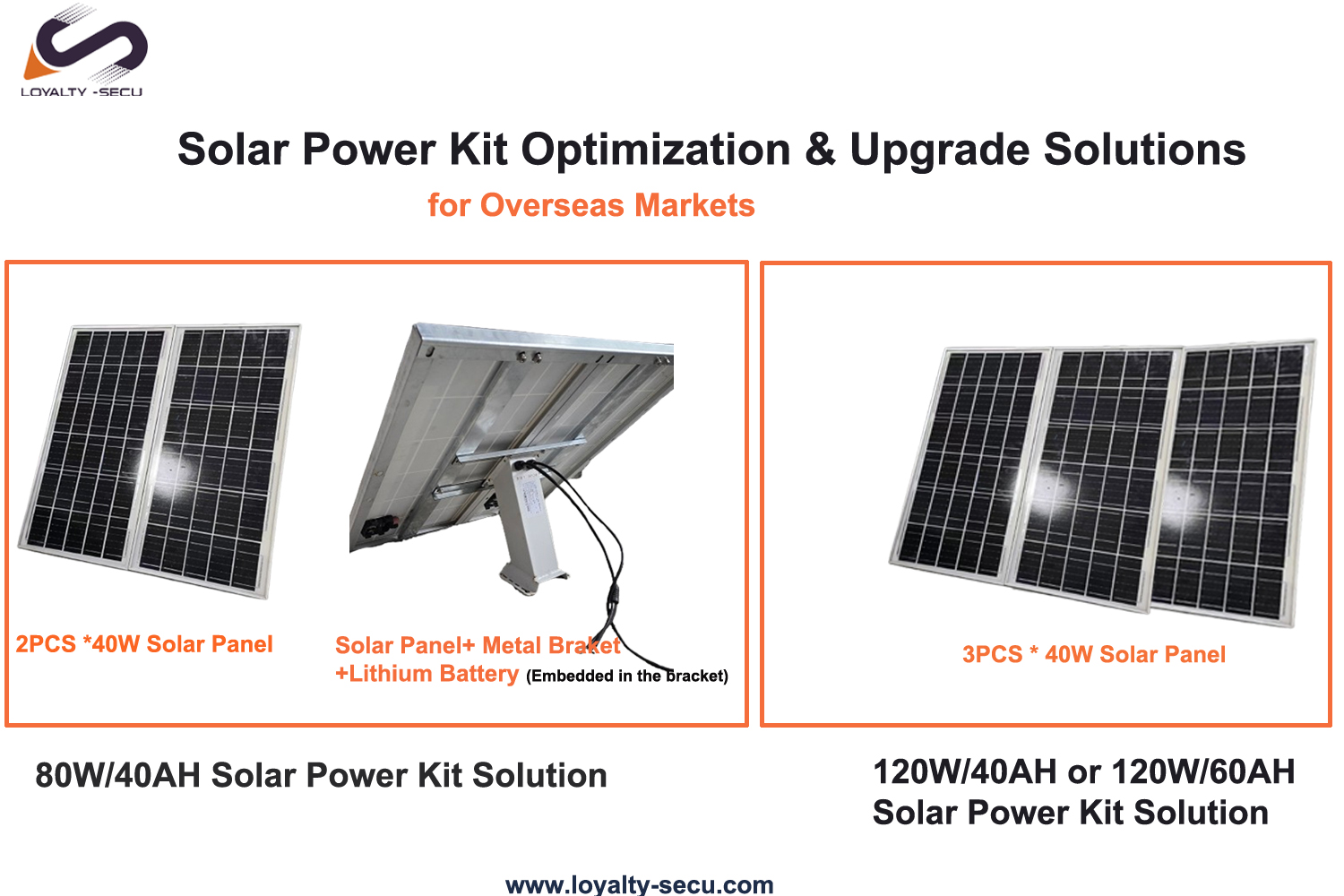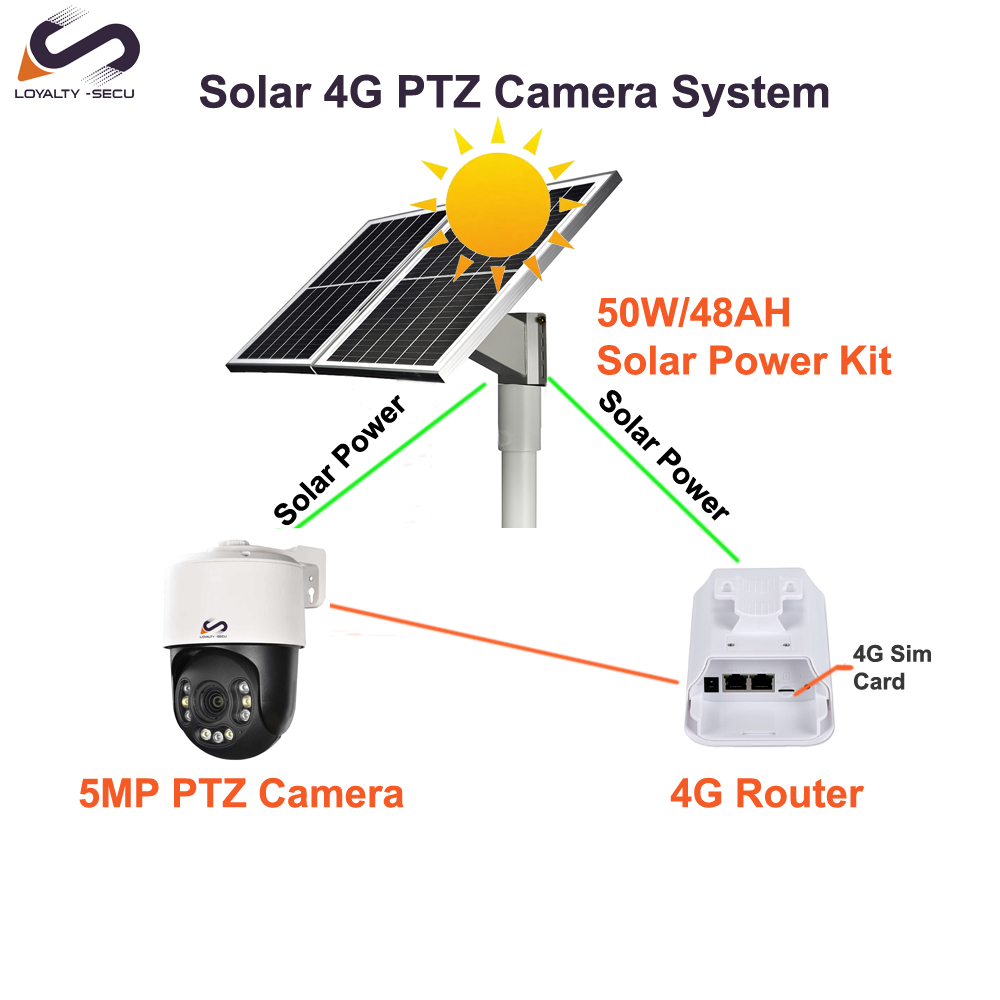Looking to put a security camera in a location where power is difficult to access, or along a remote road? Solar-powered cameras are often your best choice, saving you the cost and effort of running power lines.
Focus on energy efficiency, strong signal, and high-quality features when choosing a solar camera. These systems are eco-friendly, cost-efficient, and offer the same performance as traditional cameras with the advantage of independent power and fail-safe connectivity.
For one client, I assisted with camera system automation at a remote site where laying power lines was not only expensive but also an impractical solution. After testing a number of solar cameras, I found that solar panel efficiency and a strong signal were key. With this guide, you will be able to select the ideal solar camera that will give you a worry-free monitoring experience.
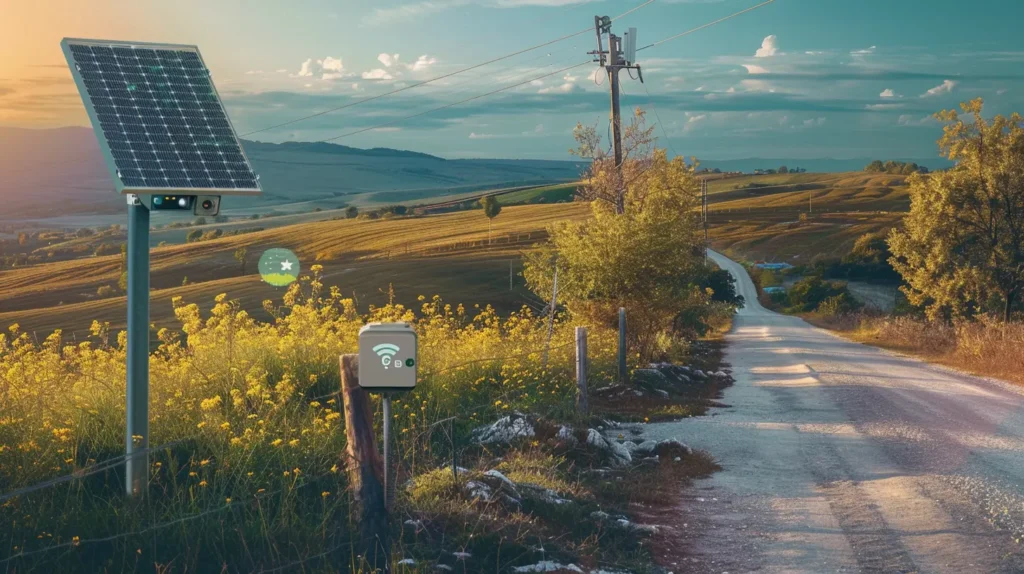
What is a solar monitoring camera?
A solar-powered surveillance camera is a digital monitoring camera powered by solar energy. They usually come equipped with a camera, a solar panel, and a rechargeable battery. The solar panel collects sunlight and stores it in the battery, which powers the camera.
These cameras are often equipped with additional features such as motion sensors and night vision. They are perfect for outdoor security applications, providing reliable monitoring without relying on traditional electrical sources.
Benefits of Solar Monitoring Systems
Solar monitoring systems provide several benefits and features that make them an attractive investment in both residential and commercial solar setups.
- Real-Time Performance Monitoring: These systems continuously monitor energy production and energy consumption, enabling users to see how much energy their solar panels produce and how well they function. This provides insights and allows early identification of issues (including system faults or overall underperformance).
- Alerts for Proactive Maintenance: Solar monitoring systems can provide alerts if performance is declining or maintenance is required. This not only prevents bigger problems from arising, but also saves time and money on repairs and downtime.
- Data-Informed Energy Consumption: By allowing users to know when there will be more generation of energy than use and thereby, aligning high energy-consuming activities (such as running their appliances) to these times. This allows you to use most of the generated solar energy in your own home and draw less electricity from the grid, resulting in significant savings.
- Mobile Accessibility: Most solar monitoring systems happen with mobile applications to enable users access performance data which from anywhere. However, this ease of use assists customers in monitoring the real-time health and functioning of their system.
- Awareness of Environmental Impact: The monitoring systems usually give information about the environmental benefits of solar energy utilization, e.g. carbon emissions reduction. This further reinforces the idea that renewable energy sources are highly beneficial.
- Improved System Performance: Monitoring tools contribute to system performance by analyzing the entire system, ensuring that a solar installation operates at peak efficiency and providing the best possible energy production and savings over time.
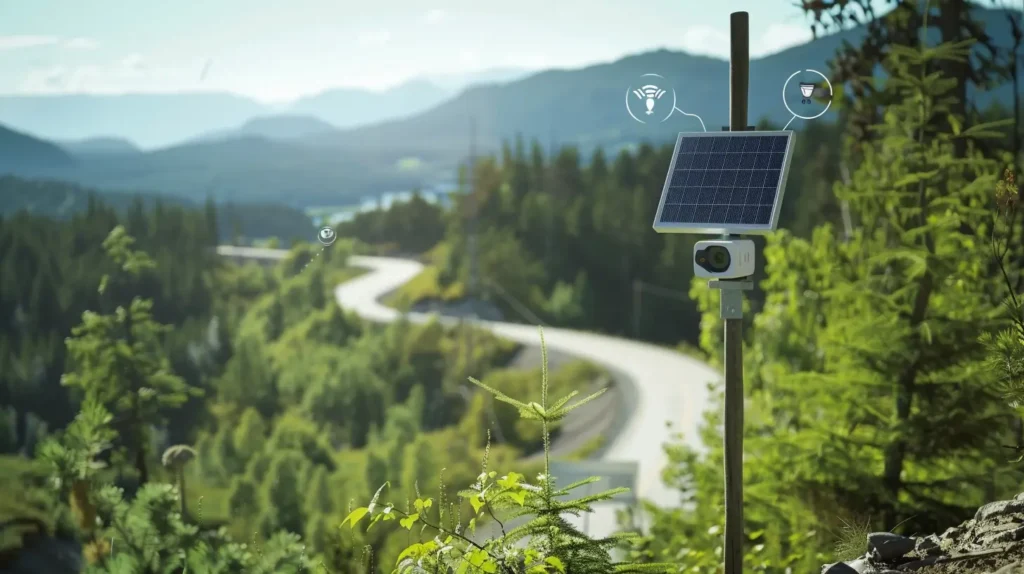
What to Look Out for When Picking a Solar Monitoring Camera
A significant aspect in choosing a solar monitoring camera is the power and efficiency of the solar panel to be monitored. For monitoring camera operation it collects adequate energy with high-efficiency solar panels, without depending on external power sources. Make sure the camera won’t consume more power than the solar panel can provide.
1.Power Requirements
Understanding how much power your camera system will use is important. This includes both the camera itself and any additional units, such as DVRs or NVRs. Choosing the right wattage-rated solar panels is crucial to ensure these power requirements are fulfilled effortlessly.
2.Sunlight Availability
Investigate the availability of sunlight on the site where the system will be set up. The location must receive good sunlight for most of the day to provide enough energy for the camera system. There are also potential things in the way, such as trees or buildings, that could block the sun, and they will greatly affect solar efficiency.
3.Battery Capacity
The capacity of the battery is important because it helps ensure continuous operation in hours of little sunlight. An increase in the size of the battery (around 10,000mAh or so) will also give you extended power during cloudy days or nighttime. Make sure the battery is large enough to keep the camera running in these situations.
4.Solar Panel Performance
Select high-efficiency solar panels (including monocrystalline types if size allows), as they generate more power from sunlight, allowing batteries to charge faster. It is recommended to get panels rated at 20W output power or better for reliable performance.
5.Video Quality
Camera resolution is important for getting clear and detailed video footage. Look for cameras that have a minimum of 1080p resolution; 4K options will provide even more visual clarity. It is important to check if the camera has night vision to see in the dark.
6.Connectivity
Think about how the camera will connect to your network. Choices usually include Wi-Fi and cellular (4G/5G). Wi-Fi cameras can be tethered to home networks, but may be limited by local conditions; cellular options may be broader, but cellular data costs may apply.
7.Smart Features
Choose cameras developed with intelligent features like remote viewing, motion detection, two-way audio, and compatibility with smart home systems like Alexa or Google Assistant. These capabilities improve usability and security.
8.Resiliency and Weather Resistance
As these cameras are usually mounted outside, they need to be made of solid materials with a weatherproof rating (IP-rated) to make sure they are usable in many climates.
9.Installation Ease
Verify that the solar monitoring camera system is easy to install, preferably wireless, to make installation easier, cheaper, and more practical.
10.Warranty and Support
Check for warranty options and if the manufacturer supports their products. You will find good warranties, offering peace of mind in regards to reliability and product performance.
With this device, we can monitor solar energy systems and observe their efficiency along with some functionalities that we will address in this article.
The unique features of these systems make our solar monitoring camera applicable in a variety of scenarios, including energy efficiency, eco-friendliness, easy installation, mobility, and more.
These systems use solar panels to harness sunlight and convert it into electricity, allowing them to be used even in remote locations and areas with limited or no access to power grid.
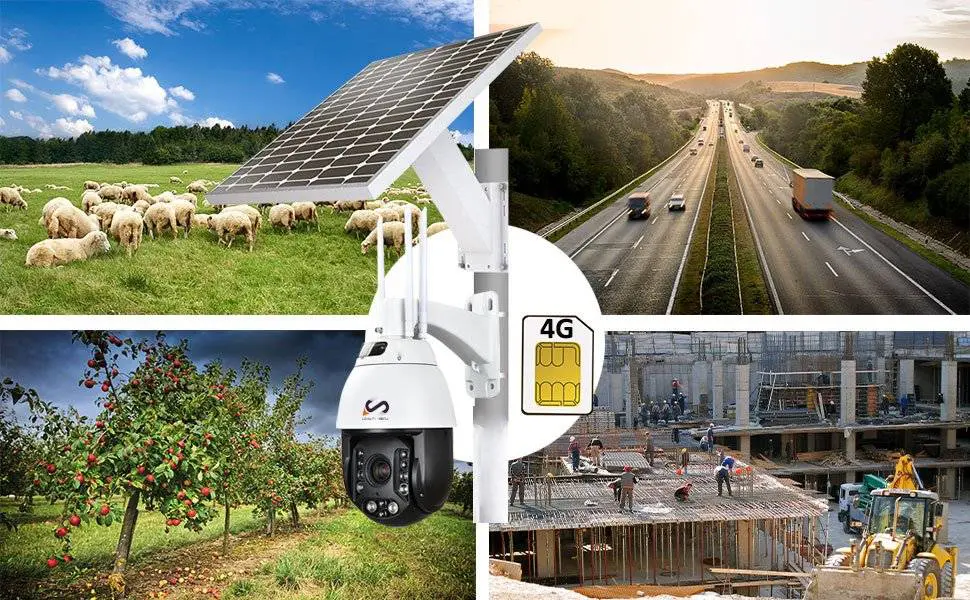
Application scenarios of solar powered camera systems:
Remote Areas: Solar security systems are perfect for monitoring remote areas like construction sites, agricultural fields, off-grid homes (including vacation homes), mines, farms, and ranches.
Construction Sites: These cameras are often used to capture the construction process and keep an eye on the site for any security and safety problems. The time-lapse video capture is a nice bonus too.
Farms and Ranches: Farmers and ranchers monitor their livestock and installations efficiently, even in off-grid places. The cameras will reduce livestock theft and enable remote monitoring of livestock.
Parking Lots: Solar security camera systems improve the security of parked cars in parking lots. They are effective in preventing auto thefts and burglaries.
Warehouses: These systems can be used to monitor outdoor storage areas and loading docks, assisting with remote surveillance, employee oversight, and preventing theft.
Solar Benefits in Public Spaces: With the ability to capture and secure large areas, solar cameras are the eco-friendly way to go while saving power.
Sport Events: They are ideal to monitor stadium surrounding area, being used for crowd control, security, and traffic management. They are portable, which means you can install them without cable headaches.
Energy: Energy companies use solar cameras to monitor high-voltage power towers and oil pipelines in remote places.
Wildlife Observation: Solar panel cameras are ideal for capturing wildlife in remote areas, such as in nature reserves and forests.
Traffic Monitoring: These cameras can be used to monitor the traffic flow, detect accidents and issue traffic violation tickets in areas where power is not easily available.
Solar-powered cameras can help secure unattended vacation homes by sending alerts for any movement detected, deterring would-be intruders.
Encourage residents to set up a network of solar cameras at key locations, at least until crime rates drop. The integration of such systems with communication technologies like 3G, 4G, 5G, and Wi-Fi enables real-time observation and immediate alert generation through wireless data transmission.
The stability and reliability of solar monitoring, combined with advanced solar panel and battery technology, ensures normal operation even during continuous rainy days, providing strong safety protection in harsh environments.
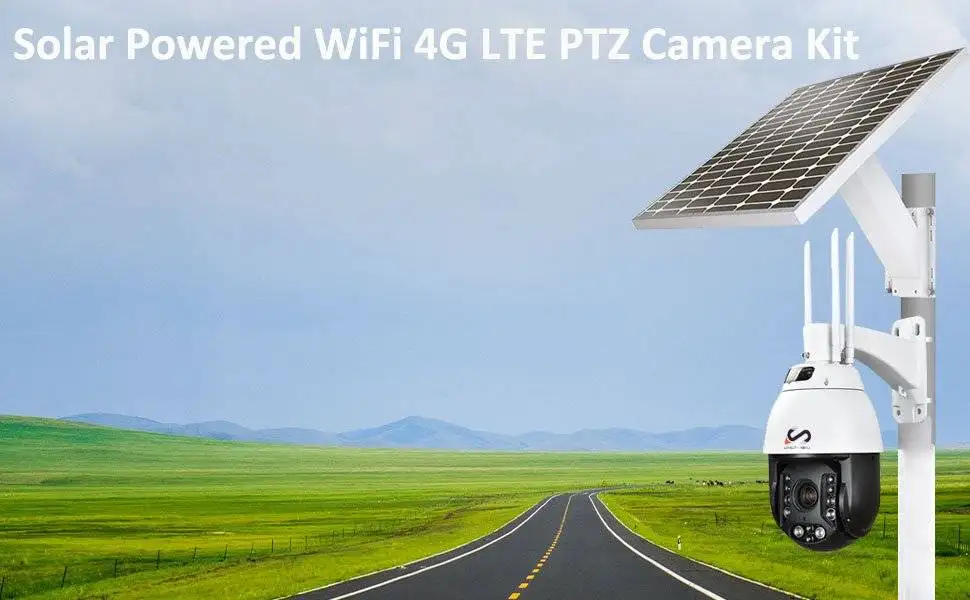
Recommended Solar Monitoring Cameras for Home and Business Use
If you’re looking for a top-notch solar monitoring camera for home or business use, Loyalty-Secu’s 5MP 4G Wi-Fi Integrated Solar Surveillance Camera is an excellent choice. This camera is specifically designed to provide high-quality surveillance with a range of features tailored to both residential and commercial needs. Below, I’ll detail its features, which make it an outstanding option.
Key Features:
- High Definition Video: The camera offers Ultra HD 2K resolution (5MP) with a 20X optical zoom, allowing for detailed monitoring of distant objects.
- Flexible Connectivity: It supports 4G LTE connectivity, making it ideal for locations without WiFi. Users can also connect via WiFi when available, providing versatility in installation options.
- Two-Way Audio: The built-in microphone and speaker enable users to communicate with individuals near the camera through the CamHi app.
- Weather Resistant Design: With an IP66 waterproof rating, this camera is built to withstand extreme weather conditions, operating effectively in temperatures ranging from -20°C to 60°C.
- Solar Powered: Equipped with a 120W solar panel and a 40AH battery, this camera is designed for off-grid use, ensuring continuous operation without the need for external power sources.
- Remote Access and Playback: Users can view live feeds and recorded footage remotely via the CamHi app, which also supports motion detection alerts.
- Night Vision Capabilities: The camera features advanced infrared night vision with a range of up to 200 meters (656 feet), ensuring clear visibility even in low-light conditions.
- Smart Patrol Functionality: The camera can automatically patrol preset areas and track moving objects, enhancing security coverage without manual intervention.
Specifications:
| Feature | Details |
|---|---|
| Image Sensor | 1/2.8″ Sony CMOS IMX335 |
| Video Resolution | 2592(H)x1944(V) |
| Lens | 20X Optical Zoom (4.7~94mm) |
| Minimum Illumination | 0.01Lux |
| IR Distance | Up to 200M |
| Storage | Supports up to 128GB TF card |
| Power Supply | 120W Solar Panel & 40AH Lithium Battery |
| Dimensions | Compact design suitable for various setups |
Why Choose the Loyalty-Secu 5MP Solar Surveillance Camera?
This camera offers high performance and ease of use, with a 20x optical zoom ideal for large areas like parking lots and gardens. Its solar-powered design ensures independence from the power grid, making it perfect for off-grid locations.
Conclusion
Selecting the appropriate solar camera involves evaluating your needs, whether for solar monitoring, security, or both, and finding one with the right power, resolution, battery life, and environmental resilience.
This information, paired with reviews of different camera models, gives you the insight needed to make the right choice for your home or business that will complement your investment in solar energy.
If you’re ready to move forward in securing your home or optimizing your solar system, contact us today to receive specific advice and suggestions you need!


